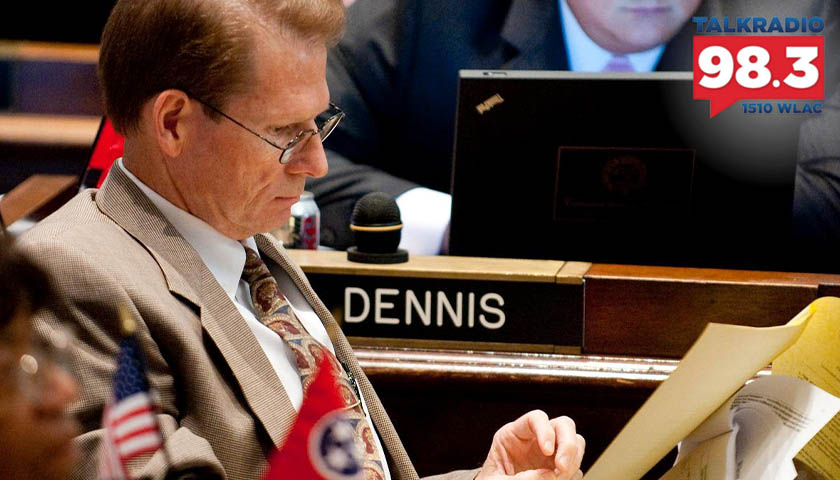Live from Music Row Tuesday morning on The Tennessee Star Report with Michael Patrick Leahy – broadcast on Nashville’s Talk Radio 98.3 and 1510 WLAC weekdays from 5:00 a.m. to 8:00 a.m. – official guest host Grant Henry welcomed State Senator Joey Hensley (R-Napier) to the newsmaker line to explain the nature of his acquired immunity bill, SB1982.
Henry: With us right now, some of you know him as your physician, some of you know him as your senator, but his name is Senator Joey Hensley. Thank you so much for joining this morning, sir.
Hensley: It’s my pleasure. Good morning.
Henry: Now, senator, your district actually tell me if I’m wrong here, but your district is going to be a little bit different in this upcoming year than previous years, is that right?
Hensley: Yes. I now represent six Southern Middle Tennessee counties, and it will change. I will no longer have Wayne, Lawrence, and Perry counties. And I will pick up Marshall County and part of Williamson County. So, yes, it will change significantly.
Henry: Let me just dive right into some of these questions about this bill, in particular, that we ask you to come on about. We’re talking about Senate Bill 1982. Some might know the House Bill 1871.
Reading straight from the bill summary here, it says, quote, this bill prohibits governmental entities, schools, or private businesses from adopting or enforcing laws, rules, or practices that fail to recognize acquired immunity as providing a level of immune protection that is at least protective level of COVID vaccine.
So I’ll put this simply to maybe break this down. This bill would require governments and businesses to treat immunity from a previous COVID infection as equal to the vaccinated people in their policies. Is that the best way to say, is that correct, senator?
Hensley: That’s correct. That’s exactly right. Anyone that has an acquired immunity would have to be treated like they had the vaccine.
Henry: And it applies specifically to Covenant. Is that correct, or does this go on to say other areas as well?
Hensley: No, it is specifically COVID-19 related, yes.
Henry: Now, look, this bill, it seems I don’t know, pretty obvious to me the one that would just sort of speak for itself. The science, I think, actually seems fairly convincing and consistent on the issue of natural immunity, especially as it pertains to COVID-19.
Let me ask, was this something that you decided to run before session began? Did a constituent bring this to concern to you what was the primary motivation for carrying it this year?
Hensley: No, it’s something I and the House sponsor got together, Ben Hulsey, and just felt like that people with the natural immunity and being a physician, I’ve seen it. And I just believe that for people with acquired immunity, the studies have shown that acquired immunity probably gives better protection than vaccines.
And certainly people that have acquired immunity should not have to have to get a vaccine. And businesses and governmental entities, especially those requiring a vaccine, should have to recognize acquired immunity because that’s the whole purpose of someone getting a vaccine so that they develop immunity.
The House sponsor and I that we needed to put this in the law so that businesses, especially governmental entities, could not force people to get a vaccine if they didn’t need it.
Spivak: Hey, senator, this is Lonnie Spivak. I just had a quick question. So to determine whether or not you have immunity, what’s required for that?
Hensley: The bill specifically says you have to have a lab test that showed that you’re immune. You could certainly get documentation of a lab test showing antibodies, or you can have a letter from a licensed physician certifying that you have immunity. So one of those two things would qualify you for the proof that you had acquired immunity.
Spivak: So a kid in school, instead of producing a vaccine card or whatever is required, you would just show a certificate showing natural immunity. Is that correct?
Hensley: Exactly. A letter from a doctor verifying it or a copy of the lab test showing that you had immunity. Yes.
Henry: If you all had just joined us, we’re speaking with Senator Joey Hensley about the Senate Bill 1982. And put simply, it just requires governments and businesses to treat immunity from a previous COVID-19 infection as equal to getting vaccinated.
And senator, looking at the way that this went down in the vote here, 75 to 20 passing out of the House. That’s 75 for and 20 against. 26-5 passing out of the Senate here. It looks like it voted right along party lines. I’m leading up to a bigger question here in about two minutes.
But I want to ask, did you have any problems passing this year? Do you have any problems in committee? Was there anybody fighting you against this throughout the year?
Hensley: This was a party-line vote, which I don’t understand. The vaccine issue has come down along party lines, but really it should not be that way. But the five votes in the Senate were the Democrats in the Senate.
As you know, there are six Democrats in the Senate or five at the time. So it was strictly a party-line vote. But I don’t know why the vaccine and the COVID-19 issue has become such a political issue.
To me, it was a medical issue, just like other vaccines that people get children get. We check their antibodies to see if they’re immune to measles or mumps or rubella. We check their titers, and if they have titers, then they’re immune and COVID-19 should be the same way.
Yes, there was some discussion in the committee, especially in the Senate, but it passed the committee seven to one. And certainly, that is the one Democrat who voted against it, and then it passed on the floor party-line vote.
Henry: And in some sense, I may even understand the party-line split on this, if for nothing else, just the pure politics, the optics of the situation. Maybe I understand that.
But interestingly enough, it looks like if I’m just reading this thing correctly, it looks like it was sent to the governor for his signature on April 19, but then sent back by Governor Lee on April 29 without his signature.
In fact, it looks like this is a part of the story that the Associated Press picked up on with headlines like the following I’ll read this quote, Tennessee gets acquired immunity COVID law, the governor won’t sign it.
Now, senator, I don’t want to put you on the spot by asking you to respond to something that you’re maybe unable to but could you provide some insight to the audience as to why you think governor Lee didn’t actually sign this bill?
Hensley: No, I really don’t have insight. Of course, we pass bills in the legislature they go to the governor he has the opportunity to sign it or not sign it and it becomes law.
This is what happened with this bill or he can veto it. But no, I had no communication with the governor’s office about why he didn’t run it.
Henry: For those that may not understand you may have already mentioned it. Here what happens now to this bill that the governor has refused to sign? Is it a law now? Are there are additional steps that need to be taken? What are we looking at?
Hensley: It becomes law after 10 days. If he does not sign a bill it becomes law automatically and it gets into the Tennessee code annotated as the law and this bill became effective it takes effect becoming law. So as soon as that time period is up and it can be put into the books and it becomes law.
There are a lot of bills that the governor deals with and most of them he signs. As the bill went through the committees, it really did not have any pushback from the governor’s office so I had no indication he would not sign it.
– – –
Tune in weekdays from 5:00 – 8:00 a.m. to The Tennessee Star Report with Michael Patrick Leahy on Talk Radio 98.3 FM WLAC 1510. Listen online at iHeart Radio.






He didn’t sign it because the Dems have him in their pockets- he caters to the Democrats. The COVID issue is political because the leftist elite have snake-charmed most of the Democratic party into believing the lie that endless COVID population control measures and the raking in of money by big pharma for a shot that does not work equal COVID control.
These two companion bills (HB 1871 / SB 1982) are now Public Chapter 930 of the Tennessee Public Acts of 2022, with an effective date of May 4, 2022, according to the Tennessee General Assembly website.